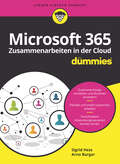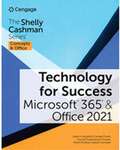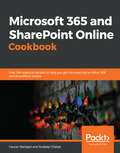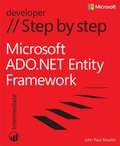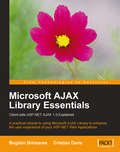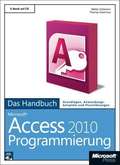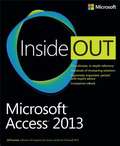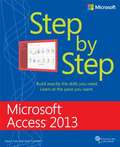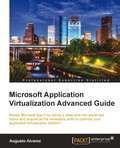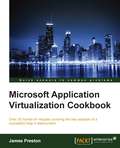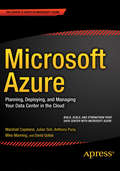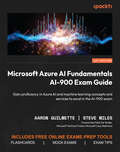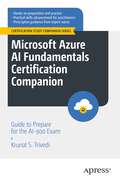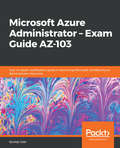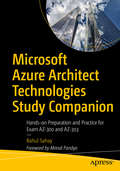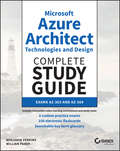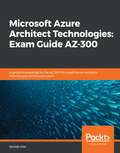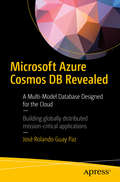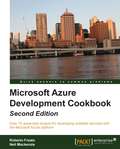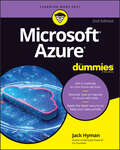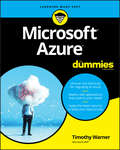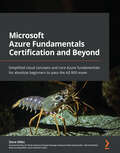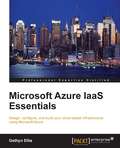- Table View
- List View
Microsoft 365 Zusammenarbeiten in der Cloud für Dummies (Für Dummies)
by Sigrid Hess Arno BurgerDas neue Microsoft 365 bietet die Chance für eine völlig neue Art der digitalen Zusammenarbeit. Flexibel und mobil. Neugierig geworden? Dann greifen Sie zu diesem Buch! Es legt die Grundlagen und erklärt Zusammenhänge und Hintergründe: Betreten Sie durch Microsoft Teams eine neue Welt und kommunizieren Sie punktgenau. Finden Sie heraus, wie Sie auf SharePoint und OneDrive Dateien organisieren und wie Sie mit Outlook, To Do und Planner Aufgaben überwachen. Da ganze Anwendungsszenarien - wie zum Beispiel das Onboarding von neuen Mitarbeitern - beschrieben werden, bekommen Sie eine gute Vorstellung davon, wie die einzelnen Komponenten ineinandergreifen.
Microsoft 365 and Office 2021 (Technology for Success and The Shelly Cashman Series)
by Sandra CableHelping you quickly get up to speed, TECHNOLOGY FOR SUCCESS AND THE SHELLY CASHMAN SERIES MICROSOFT 365 & OFFICE 2021, 1st edition, includes the latest on Microsoft 365 and Office 2021 features along with enhanced support for Mac users. Its trademark step-by-step, screen-by-screen, project-based approach enables you to expand your understanding of Office applications through hands-on experimentation and critical thinking. <p><p>Module Learning Objectives are mapped to Microsoft Office Specialist (MOS) certification objectives, reinforcing the critical skills needed for college and career success. Other Ways boxes reveal alternate click paths to achieve a step, while BTW call-outs offer helpful hints as you work through your projects so you can make the most of Microsoft Office tools. In addition, MindTap and SAM (Skills Assessment Manager) online resources help maximize your study time—and results.
Microsoft 365 and SharePoint Online Cookbook: A complete guide to Microsoft Office 365 apps including SharePoint, Power Platform, Copilot and more
by Gaurav Mahajan Sudeep Ghatak Nate Chamberlain Scott BrewsterUnlock over 100 recipes for mastering Microsoft 365. Boost productivity with Copilot, collaborate with SharePoint and Teams, automate tasks, create apps and reports using Power Automate (with RPA), Power Apps, Power BI, and more. Print or Kindle book purchase includes a free PDF eBook.Key FeaturesEnhance collaboration and productivity using SharePoint, Teams, OneDrive, Viva, Planner, and Microsoft FormsAutomate processes, build apps, bots, and dashboards with Power Automate (with RPA), Power Apps, Copilot Studio, and Power BIHarness Copilot, the new AI virtual assistant, for seamless support in your everyday tasksBook DescriptionMicrosoft 365 offers tools for content management, communication, process automation, and report creation. Microsoft 365 and SharePoint Online Cookbook maximizes workplace collaboration and productivity using SharePoint Online, Teams, OneDrive, Delve, M365 Search, Copilot, Power Platform, Viva, Planner, and Microsoft Forms. You will find thoroughly updated recipes for SharePoint Online, covering sites, lists, libraries, pages, web parts, and learn SharePoint Framework (SPFx) basics for building solutions. You will explore many Microsoft Teams recipes to prepare it to be your organization’s central collaboration hub. You will be able to unlock Power Platform potential with recipes for Power Apps to enable low-code/no-code app development and learn to automate tasks with Power Automate and Power Automate Desktop. The book teaches you data visualization with Power BI, and chatbot creation with Power Virtual Agents (Copilot Studio). Finally, you will also learn about the cutting-edge Copilot and Gen AI functionality in Microsoft 365 and Power Platform. By the end, you will be equipped with skills to effectively use Microsoft 365, SharePoint Online, and the Power Platform. Whether it's enhancing career prospects or improving business operations, this book is a perfect companion on your journey through the Microsoft Office 365 suite.What you will learnCollaborate effectively with SharePoint, Teams, OneDrive, Delve, Search, and VivaBoost creativity and productivity with Microsoft CopilotDevelop and deploy custom applications using Power AppsCreate custom bots using Power Virtual Agents (Copilot Studio)Integrate with other apps, automate workflows and repetitive processes with Power Automate/Desktop (RPA)Design reports and engaging dashboards with Power BIUtilize Planner, To Do, and gather feedback with polls and surveys in Microsoft FormsExperience seamless integration in the mobile platformWho this book is forThis cookbook caters to professionals stepping into the world of Microsoft 365 and SharePoint Online. It is tailored for a broad spectrum of skillsets including general business professionals, IT administrators, and enterprise architects who are newcomers to Microsoft 365, offering valuable insights for establishing a contemporary, digital workplace effectively.
Microsoft 365 and SharePoint Online Cookbook: Over 100 actionable recipes to help you perform everyday tasks effectively in Microsoft 365
by Gaurav Mahajan Sudeep GhatakEmbrace modern solutions to enhance collaboration, teamwork, robotic process automation, and business intelligence in your organization using powerful Microsoft 365 services (formerly Office 365) Key Features Gain a complete overview of popular Microsoft 365 services using practical recipes and expert insights Collaborate with your team and external users effectively using SharePoint and Teams Create no-code and low-code solutions, such as bots, forms, dashboards, and workflows, using the Power platform Book Description Microsoft 365 in an integrated suite that provides intelligent tools for managing everyday organizational tasks like content management, communication, creating reports, and automating business processes. With this book, you'll get to grips with popular apps from Microsoft, with a focus on enabling workspace collaboration and productivity using Microsoft SharePoint Online, Teams, and the Power Platform to name a few. In addition to guiding you through the implementation of Microsoft 365 apps, this practical guide helps you to learn from a Microsoft consultant's extensive experience of working with the Microsoft business suite. Starting with a quick overview of the M365 ecosystem, the book covers recipes for implementing SharePoint Online for various content management tasks. You'll learn how to create sites for your organization and enhance collaboration across the business and then see how you can boost productivity with apps such as Microsoft Teams, Power Platform, Planner, Delve, and M365 Groups. Using a step-by-step approach, you'll also find out how to use the Power Platform efficiently, making the most of Microsoft PowerApps, Power Automate, PowerBI, and Power Virtual Agents. Finally, the book focuses on the SharePoint framework, which helps you to build custom Teams and SharePoint solutions. By the end of the book, you'll be equipped with the skills required to set up Microsoft 365 and SharePoint Online and be ready to enhance business productivity using a variety of tools. What you will learn Get to grips with a wide range of apps and cloud services in Microsoft 365 Discover ways to use SharePoint Online to create and manage content Store and share documents using SharePoint Online Improve your search experience with Microsoft Search Leverage the Power Platform to build business solutions with Power Automate, Power Apps, Power BI, and Power Virtual Agents Enhance native capabilities in SharePoint and Teams using the SPFx framework Use Microsoft Teams to meet, chat, and collaborate with colleagues or external users Who this book is for This book is for business professionals, IT administrators, enterprise developers and architects, and anyone who wants to get to grips with using M365 for effective implementation of Microsoft apps. Prior experience with Office 365 and SharePoint will assist with understanding the recipes effortlessly.
Microsoft ADO.NET Entity Framework Step by Step
by John Paul MuellerYour hands-on guide to Entity Framework fundamentals Expand your expertise--and teach yourself the fundamentals of the Microsoft ADO.NET Entity Framework 5. If you have previous programming experience but are new to the Entity Framework, this tutorial delivers the step-by-step guidance and coding exercises you need to master core topics and techniques. Discover how to: Access data in a managed way--using minimal code Apply three workflows supported by the Entity Framework Perform essential tasks with full automation in place Manipulate data with both LINQ and Entity SQL Create examples that rely on Table-Valued Functions Determine the remedies for Entity-specific exceptions Explore the use of optimistic and pessimistic concurrency Define mappings between your applications and data sources
Microsoft AJAX Library Essentials: Client-side ASP.NET AJAX 1.0 Explained
by Bogdan BrinzareaThis book is a practical tutorial to get you confident and comfortable working with the Microsoft AJAX suite. Packed with step-by-step examples and detailed explanations of how the examples work, this book is the ideal first step into the exciting world of AJAX in ASP.NET This book has been written for ASP.NET developers entering the world of the ASP.NET AJAX Framework, and for existing ASP.NET AJAX developers looking for a more detailed tutorial on the client-side of the framework: the Microsoft AJAX Library.
Microsoft Access 2010 Programmierung - Das Handbuch
by Walter Doberenz Thomas GewinnusAccess-Programmierung für die Praxis von Praktikern beschrieben! Dieses Buch bietet Ihnen zunächst eine fundierte Einführung in die Datenbankprogrammierung mit Access 2010 unter Verwendung von Visual Basic für Applikationen (VBA) und SQL. Ausführliches Know-how über die Gestaltung der Benutzerschnittstelle sowie jede Menge universell einsetzbarer Routinen und die richtigen Lösungen für Ihre Probleme stehen danach im Mittelpunkt des Buchs. Die erforderlichen theoretischen Grundlagen werden Ihnen klar und verständlich vermittelt, ansonsten orientiert sich der Inhalt an praktischer Verwendbarkeit und Nutzen der besprochenen Beispiele und Konzepte. Mit diesem Ansatz stellt das Buch ohne unnötigen Ballast die Informationen zur Verfügung, die Sie brauchen, um schnell zu Ergebnissen zu kommen und spart Ihnen so eine Menge Zeit und Nerven bei der Entwicklung Ihrer Datenbanklösungen.
Microsoft Access 2013 Inside Out
by Jeff ConradConquer Microsoft Access 2013--from the inside out! You're beyond the basics, so dive right into Access 2013--and use your skills to create sophisticated database apps! This supremely organized reference packs hundreds of timesaving solutions, troubleshooting tips, and workarounds. It's all muscle and no fluff. Discover how the experts tackle Access 2013--and challenge yourself to new levels of mastery. Build an Access Services web app with Microsoft SharePoint Server Automate your Access web app with data macros Create tables in your Access web app using built-in templates Aggregate and display your web app data using totals queries Use the Autocomplete control to quickly search for related data Create a Summary view to consolidate and group information Display related data on your views with the Related Items control Package your web app for use by others in your organization Plus--download chapters on building desktop databases For Intermediate and Advanced Users and Database Designers
Microsoft Access 2013 Plain & Simple
by Andrew Couch<p>Get the full-color, visual guide that makes learning Microsoft Access 2013 plain and simple! Follow the book’s easy steps and screenshots and clear, concise language to learn the simplest ways to build a database and sort information.</p>
Microsoft Access 2013 Step By Step
by Joan Lambert Joyce CoxExperience learning made easy--and quickly teach yourself how to build your own database with Access 2013. With Step by Step, you set the pace--building and practicing the skills you need, just when you them! Includes downloadable practice files and a companion eBook. Build a database from scratch or ready templates Create easy-to-use data-entry forms Write queries to extract and manipulate data Design reports to summarize data in effective ways Import data from other databases and documents
Microsoft Application Virtualization Advanced Guide
by Augusto AlvarezA practical tutorial containing clear, step-by-step explanations of all the concepts required to understand the technology involved in virtualizing your application infrastructure. Each chapter uses real-world scenarios so that the readers can put into practice what they learn immediately and with the right guidance. Each topic is written defining a common need and developing the process to solve it using Microsoft App-V. This book is for system administrators or consultants who want to master and dominate App-V, and gain a deeper understanding of the technology in order to optimize App V implementations. Even though the book does not include basic steps like installing App-V components or sequencing simple applications; application virtualization beginners will receive a comprehensive look into App-V before jumping into the technical process of each chapter.
Microsoft Application Virtualization Cookbook
by James PrestonIf you have some experience with App-V but are overwhelmed by the range of features on offer, then this book is for you. A basic understanding of App-V and common Windows Server technologies (Active Directory/Group Policy/PowerShell) is necessary.
Microsoft Azure
by Marshall Copeland Julian Soh Anthony Puca Mike Manning David GollobWritten for IT and business professionals, this book provides the technical and business insight needed to plan, deploy and manage the services provided by the Microsoft Azure cloud. Find out how to integrate the infrastructure-as-a-service (IaaS) and platform-as-a-service (PaaS) models with your existing business infrastructure while maximizing availability, ensuring continuity and safety of your data, and keeping costs to a minimum. The book starts with an introduction to Microsoft Azure and how it differs from Office 365--Microsoft''s ''other'' cloud. You''ll also get a useful overview of the services available. Part II then takes you through setting up your Azure account, and gets you up-and-running on some of the core Azure services, including creating web sites and virtual machines, and choosing between fully cloud-based and hybrid storage solutions, depending on your needs. Part III now takes an in-depth look at how to integrate Azure with your existing infrastructure. The authors, Anthony Puca, Mike Manning, Brent Rush, Marshall Copeland and Julian Soh, bring their depth of experience in cloud technology and customer support to guide you through the whole process, through each layer of your infrastructure from networking to operations. High availability and disaster recovery are the topics on everyone''s minds when considering a move to the cloud, and this book provides key insights and step-by-step guidance to help you set up and manage your resources correctly to optimize for these scenarios. You''ll also get expert advice on migrating your existing VMs to Azure using InMage, mail-in and the best 3rd party tools available, helping you ensure continuity of service with minimum disruption to the business. In the book''s final chapters, you''ll find cutting edge examples of cloud technology in action, from machine learning to business intelligence, for a taste of some exciting ways your business could benefit from your new Microsoft Azure deployment. What you''ll learn What Microsoft Azure can do (infrastructure and platform as a service), and reasons for adoption How to plan for successful integration of Azure with your existing IT infrastructure How to use the Azure management portal to manage basic workload items, and how to use the enterprise portal for monitoring and reporting How to create web sites on Azure to save platform running and management costs and scale easily How to create virtual machines on Azure and how to migrate them safely from an existing infrastructure When and why to choose different storage options on Azure How to extend your on-premise network to Azure How to handle identity management using Azure Active Directory, from the free edition to the full Enterprise Mobility Suite How to manage your resources with clusters and affinity groups to maximize availability, minimize costs, and optimize disaster recovery scenarios Advanced applications of Azure to machine learning and business intelligence Who this book is for This book is for IT and business administrators and managers looking to deploy some or all of Microsoft Azure''s services to their existing business infrastructure, while maximizing availability, building robust disaster recovery solutions, and minimizing costs. Table of Contents Part I: Introducing Microsoft Azure Chapter 1: Why Choose Microsoft Azure Chapter 2: Azure Services Overview Chapter 3: Azure Real-World Scenarios Chapter 4: Planning Your Azure Deployment Part II: Microsoft Azure Quick Start Chapter 5: Getting Started with Azure Websites Chapter 6: Getting Started with Azure Virtual Machines Chapter 7: Understanding Your Storage Options Part III: Extending Your On-Premise Environment with Azure Chapter 8: Extending Your Network with Azure Chapter 9: Identity Management with Azure Active Directory Chapter 10: Extending Azure Active Directory Chapter 11: Clusters, Regional VNets, High Availability, and Disaster Recovery Chapter 12: Migrating Your Virtual Machines to Azure Chapter 13: Monitoring and Reporting Part IV: Futures and Advanced Topics Chapter 1...
Microsoft Azure AI Fundamentals AI-900 Exam Guide: Gain proficiency in Azure AI and machine learning concepts and services to excel in the AI-900 exam
by Steve Miles Aaron GuilmetteGet ready to pass the certification exam on your first attempt by gaining actionable insights into AI concepts, ML techniques, and Azure AI services covered in the latest AI-900 exam syllabus from two industry experts Key FeaturesDiscover Azure AI services, including computer vision, Auto ML, NLP, and OpenAIExplore AI use cases, such as image identification, chatbots, and moreWork through 145 practice questions under chapter-end self-assessments and mock examsPurchase of this book unlocks access to web-based exam prep resources, including mock exams, flashcards, and exam tipsBook DescriptionThe AI-900 exam helps you take your first step into an AI-shaped future. Regardless of your technical background, this book will help you test your understanding of the key AI-related topics and tools used to develop AI solutions in Azure cloud. This exam guide focuses on AI workloads, including natural language processing (NLP) and large language models (LLMs). You’ll explore Microsoft’s responsible AI principles like safety and accountability. Then, you’ll cover the basics of machine learning (ML), including classification and deep learning, and learn how to use training and validation datasets with Azure ML. Using Azure AI Vision, face detection, and Video Indexer services, you’ll get up to speed with computer vision-related topics like image classification, object detection, and facial detection. Later chapters cover NLP features such as key phrase extraction, sentiment analysis, and speech processing using Azure AI Language, speech, and translator services. The book also guides you through identifying GenAI models and leveraging Azure OpenAI Service for content generation. At the end of each chapter, you’ll find chapter review questions with answers, provided as an online resource. By the end of this exam guide, you’ll be able to work with AI solutions in Azure and pass the AI-900 exam using the online exam prep resources.What you will learnDiscover various types of artificial intelligence (AI)workloads and services in AzureCover Microsoft's guiding principles for responsible AI development and useUnderstand the fundamental principles of how AI and machine learning workExplore how AI models can recognize content in images and documentsGain insights into the features and use cases for natural language processingExplore the capabilities of generative AI servicesWho this book is forWhether you're a cloud engineer, software developer, an aspiring data scientist, or simply interested in learning AI/ML concepts and capabilities on Azure, this book is for you. The book also serves as a foundation for those looking to attempt more advanced AI and data science-related certification exams (e.g. Microsoft Certified: Azure AI Engineer Associate). Although no experience in data science and software engineering is required, basic knowledge of cloud concepts and client-server applications is assumed.
Microsoft Azure AI Fundamentals Certification Companion: Guide to Prepare for the AI-900 Exam (Certification Study Companion Series)
by Krunal S. TrivediPrepare for the Azure AI Fundamentals certification examination. This book covers the basics of implementing various Azure AI services in your business. The book not only helps you get ready for the AI-900 exam, but also helps you get started in the artificial intelligence (AI) world. The book starts with a short overview of the AI-900 exam and takes you through the exam prerequisites and the structure of the exam. You will then learn basic and advanced AI in Azure. Principles of responsible AI, Azure Machine Learning (ML), Azure Cognitive Services, and Bot Services are covered, followed by a practice test. You will go through ML fundamental concepts, model training, and validation along with case studies and a practice test for better preparation. The book includes the fundamentals of Azure and computer vision cognitive services. Various vision services and face services are demonstrated as well as analyzing image and text using OCR. You will understand concepts of natural language processing (NLP) such as text analysis, language modelling, entity recognition, sentiment analysis, speech recognition, and synthesis and also learn how to leverage Microsoft Azure for NLP. After reading this book, you will be able to implement various Azure AI services and prepare for the Azure AI Fundamentals certification exam, AI-900.What Will You LearnUnderstand AI fundamentals and responsibilitiesKnow the Microsoft Azure offerings for AIUnderstand foundational concepts for ML and Azure offerings for MLUnderstand Azure Cognitive Services such as Custom Vision, Face, Form Recognizer, Text-to-Speech, and Image AnalysisWho This Book Is ForAzure and AI users working with ML services
Microsoft Azure Administrator – Exam Guide AZ-103: Your in-depth certification guide in becoming Microsoft Certified Azure Administrator Associate
by Sjoukje ZaalManage Microsoft Azure cloud services that span storage, security, networking, and compute cloud capabilities and ace the AZ-103 Exam Key FeaturesMaster features and concepts pertaining to Azure's Administration servicesGain a deep understanding of various Azure services related to infrastructure, applications, and environmentsGauge yourself by giving mock tests with up-to-date exam questionsBook DescriptionMicrosoft Azure Administrator – Exam Guide AZ-103 will cover all the exam objectives that will help you earn Microsoft Azure Administrator certification. Whether you want to clear AZ-103 exam or want hands-on experience in administering Azure, this study guide will help you achieve your objective. It covers the latest features and capabilities around configuring, managing, and securing Azure resources. Following Microsoft's AZ-103 exam syllabus, this guide is divided into five modules. The first module talks about how to manage Azure subscriptions and resources. You will be able to configure Azure subscription policies at Azure subscription level and learn how to use Azure policies for resource groups. Later, the book covers techniques related to implementing and managing storage in Azure. You will be able to create and configure backup policies and perform restore operations. The next module will guide you to create, configure, and deploy virtual machines for Windows and Linux. In the last two modules, you will learn about configuring and managing virtual networks and managing identities. The book concludes with effective mock tests along with answers so that you can confidently crack this exam.By the end of this book, you will acquire the skills needed to pass Exam AZ-103.What you will learnConfigure Azure subscription policies and manage resource groupsMonitor activity log by using Log AnalyticsModify and deploy Azure Resource Manager (ARM) templatesProtect your data with Azure Site RecoveryLearn how to manage identities in AzureMonitor and troubleshoot virtual network connectivityManage Azure Active Directory Connect, password sync, and password writebackWho this book is forThis book is for Azure administrators, systems administrators or anyone preparing for AZ 103 exam and wants to master Azure's various administration features. Readers should have proficiency in working with PowerShell, CLI and other day-to-day Azure administration tasks.
Microsoft Azure Architect Technologies Study Companion: Hands-on Preparation and Practice for Exam AZ-300 and AZ-303
by Rahul SahayUse this invaluable study companion and hands-on guide to help you prepare for the AZ-300 and AZ-303 certification exam and get well on your way to becoming an Azure Solutions Architect.The book starts with an overview of public, private, and hybrid clouds and then goes into configuration of virtual machines. Azure Resource Manager (ARM) and VM encryption are discussed along with Azure Monitor. You will learn how to work with Azure recommendations and analyze your resource configuration. Storage solutions, connecting to networks, and Azure Active Directory are discussed in depth, with examples. You will be able to migrate servers to Azure and demonstrate server-less computing, load balancing, and app services in Azure. You also will learn about Service Fabric, Azure Kubernetes services, and data security in Azure. Cosmos DB and Relational DB are covered and you will know how to connect to cloud databases using SQL Server Management Studio (SSMS). The book presents exercises, practice questions, and Azure architecture best practices.What Will You LearnBe able to speak with customers, understand their infrastructure, and provide a blueprint to migrate their framework to AzureGo beyond moving on-premise frameworks to Azure and design solutions on Azure from the startKnow Azure architecture best practices to optimize Azure deploymentsComplete practice exercises to prepare for exam lab assignmentsTake a mock exam for practiceWho This Book Is ForAzure developers, Azure Solution Architects, and those aspiring to fill these roles, who possess some familiarity with cloud computing
Microsoft Azure Architect Technologies and Design Complete Study Guide: Exams AZ-303 and AZ-304
by William Panek Benjamin PerkinsBecome a proficient Microsoft Azure solutions architect Azure certifications are critical to the millions of IT professionals Microsoft has certified as MCSE and MCSA in Windows Server in the last 20 years. All of these professionals need to certify in key Azure exams to stay current and advance in their careers. Exams AZ-303 and AZ-304 are the key solutions architect exams that experienced Windows professionals will find most useful at the intermediate and advanced points of their careers. Microsoft Azure Architect Technologies and Design Complete Study Guide Exams AZ-303 and AZ-304 covers the two critical Microsoft Azure exams that intermediate and advanced Microsoft IT professionals will need to show proficiency as their organizations move to the Azure cloud. • Understand Azure • Set up your Microsoft Cloud network • Solve real-world problems • Get the confidence to pass the exam By learning all of these things plus using the Study Guide review questions and practice exams, the reader will be ready to take the exam and perform the job with confidence.
Microsoft Azure Architect Technologies: A guide to preparing for the AZ-300 Microsoft Azure Architect Technologies certification exam
by Sjoukje ZaalBecome a certified Azure Architect and learn to design effective solutions that span compute, security, networking, and development Key Features Learn to successfully design and architect powerful and cost-effective solutions on Microsoft Azure Prepare to gain AZ-300 certification with the help of mock tests and practice questions Enhance your computing, networking, storage, and security skills to design modern cloud-based solutions Book Description From designing solutions on Azure to configuring and managing virtual networks, AZ-300 certification can help you achieve all this and more. Whether you want to get certified or gain hands-on experience in administering, developing, and architecting Azure solutions, this study guide will help you get started. The book features not only the different exam objectives, but also guides you through configuring, managing, securing, and architecting Azure resources. Divided into five modules, this book will systematically take you through the different concepts and features as you advance through the sections. The first module demonstrates how to deploy and configure infrastructure. You will cover techniques related to implementing workloads and security, before learning how to create and deploy apps in the next module. To build on your knowledge, the final two modules will get you up to speed with implementing authentication, data security, and application and platform monitoring, along with covering Azure storage, alerting, and automation strategies. Finally, you'll work through exam-based mock tests with answers to boost your confidence in passing the exam. By the end of this book, you'll have learned the concepts and techniques you need to know in order to prepare for the AZ-300 exam, along with the skills to design effective solutions on Microsoft Azure. What you will learn Manage Azure subscriptions and resources Understand how to migrate servers to Azure Configure and manage virtual networks Monitor and troubleshoot virtual network connectivity Manage Azure Active Directory (Azure AD) Connect and implement multi-factor authentication Implement and manage hybrid identities Develop solutions that use Cosmos DB and the Azure SQL Database Get to grips with implementing secure data solutions Who this book is for This book is for solution architects and experienced developers who advise stakeholders and translate business requirements into secure, scalable, and reliable solutions. Technical architects interested in learning more about designing cloud solutions will also find this book useful. Some experience and knowledge of various aspects of IT operations, including networking, security, business continuity, disaster recovery, budgeting, and governance are required to grasp the concepts covered in the book effectively.
Microsoft Azure Cosmos DB Revealed: A Multi-Model Database Designed for the Cloud
by José Rolando Guay PazLearn the main features of Azure Cosmos DB and how to use Microsoft’s multi-model database service as a data store for mission-critical applications. The clear examples help in writing your own applications to take advantage of Cosmos DB’s multi-model, globally distributed, elastic database. Simple step-by-step instructions show how to resolve common and uncommon scenarios involving Azure Cosmos DB, and scenarios such as delivering extremely low response times (in the order of milliseconds), and scaling rapidly and globally.Microsoft Azure Cosmos DB Revealed demonstrates a multitude of possible implementations to get you started. This book guides you toward best practices to get the most out of Microsoft’s Cosmos DB service. Later chapters in the book cover advanced implementation features, helping you master important elements such as securing the database, querying, and using various APIs. What You'll LearnSet up a development environment to work with Azure Cosmos DBConfigure Azure Cosmos DB in a production environment with multi-region distributionQuery using all APIs, including SQL, JavaScript, MongoDB, and GraphWork with the Azure Cosmos DB.NET SDK in an application you builtAccess Cosmos DB from web applications created in .NETWho This Book Is ForDevelopers who build applications to be hosted in Microsoft Azure, whether they use PaaS or IaaS. No previous knowledge of Azure Cosmos DB is assumed, but readers must be familiar with developing applications in Microsoft Visual Studio.
Microsoft Azure Development Cookbook Second Edition
by Neil Mackenzie Roberto FreatoIf you are an architect, this book will help you make the correct decisions about which Azure building blocks to use. If you are a developer, this book will help you understand how to use them appropriately, and if you are a .NET developer, this book is a pure delight.
Microsoft Azure For Dummies
by Jack A. HymanThe must-have reference for Azure newcomers As Microsoft's Azure platform takes a larger stake in the cloud computing world, more tech pros need to know the ins-and-outs of this fast-growing platform. Microsoft Azure For Dummies is the essential guide for users who are new to the platform. Take your first steps into the world of Azure as you learn all about the core services—straight from a Microsoft expert. This book covers the Azure essentials you need to know, including building a virtual network on Azure, launching and scaling applications, migrating existing services, and keeping everything secure. In classic Dummies style, you’ll learn the fundamentals of Azure’s core services and—when you’re ready—how to move into more advanced services. Discover the basics of cloud computing with Microsoft Azure and learn what services you can access with Azure Build your cloud network with Azure and migrate an existing network to the platform Scale applications seamlessly and make sure your security is air-tightUpdated to included expanded information on data resources, machine learning, artificial intelligence, and collaboration, Microsoft Azure For Dummies, 2nd Edition answers the call for an entry-level, comprehensive guide that provides a simple-to-understand primer on core Azure services. It’s an invaluable resource for IT managers and others arriving at the platform for the first time.
Microsoft Azure For Dummies
by Timothy L. WarnerYour roadmap to Microsoft Azure Azure is Microsoft’s flagship cloud computing platform. With over 600 services available to over 44 geographic regions, it would take a library of books to cover the entire Azure ecosystem. Microsoft Azure For Dummies offers a shortcut to getting familiar with Azure’s core product offerings used by the majority of its subscribers. It’s a perfect choice for those looking to gain a quick, basic understanding of this ever-evolving public cloud platform. Written by a Microsoft MVP and Microsoft Certified Azure Solutions Architect, Microsoft Azure For Dummies covers building virtual networks, configuring cloud-based virtual machines, launching and scaling web applications, migrating on-premises services to Azure, and keeping your Azure resources secure and compliant. Migrate your applications and services to Azure with confidence Manage virtual machines smarter than you've done on premises Deploy web applications that scale dynamically to save you money and effort Apply Microsoft's latest security technologies to ensure compliance to maintain data privacy With more and more businesses making the leap to run their applications and services on Microsoft Azure, basic understanding of the technology is becoming essential. Microsoft Azure For Dummies offers a fast and easy first step into the Microsoft public cloud.
Microsoft Azure Fundamentals Certification and Beyond: Simplified cloud concepts and core Azure fundamentals for absolute beginners to pass the AZ-900 exam
by Steve Miles Peter De TenderGain in-depth knowledge of Azure fundamentals that will make it easy for you to achieve AZ-900 certificationKey FeaturesGet fundamental knowledge of cloud concepts and the Microsoft Azure platformExplore practical exercises to gain experience of working with the Microsoft Azure platform in the real worldPrepare to achieve AZ-900 certification on the first go with the help of simplified examples covered in the bookBook DescriptionThis is the digital and cloud era, and Microsoft Azure is one of the top cloud computing platforms. It's now more important than ever to understand how the cloud functions and the different services that can be leveraged across the cloud.This book will give you a solid understanding of cloud concepts and Microsoft Azure, starting by taking you through cloud concepts in depth, then focusing on the core Azure architectural components, solutions, and management tools. Next, you will understand security concepts, defense-in-depth, and key security services such as Network Security Groups and Azure Firewall, as well as security operations tooling such as Azure Security Center and Azure Sentinel. As you progress, you will understand how identity, governance, privacy, and compliance are managed in Azure. Finally, you will get to grips with cost management, service-level agreements, and service life cycles. Throughout, the book features a number of hands-on exercises to support the concepts, services, and solutions discussed. This provides you with a glimpse of real-world scenarios, before finally concluding with practice questions for AZ-900 exam preparation.By the end of this Azure book, you will have a thorough understanding of cloud concepts and Azure fundamentals, enabling you to pass the AZ-900 certification exam easily.What you will learnExplore cloud computing with Azure cloudGain an understanding of the core Azure architectural componentsAcquire knowledge of core services and management tools on AzureGet up and running with security concepts, security operations, and protection from threatsFocus on identity, governance, privacy, and compliance featuresUnderstand Azure cost management, SLAs, and service life cyclesWho this book is forThis Azure fundamentals book is both for those with technical backgrounds and non-technical backgrounds who want to learn and explore the field of cloud computing, especially with Azure. This book will also help anyone who wants to develop a good foundation for achieving advanced Azure certifications. There is no prerequisite for this book except a willingness to learn and explore cloud concepts and Microsoft Azure.
Microsoft Azure IaaS Essentials
by Gethyn EllisThis book is intended for system administrators and other IT professionals who need to both design and implement an Azure-based cloud solution. With the help of this book, you will soon master the basic tasks needed to build a cloud-based solution.
